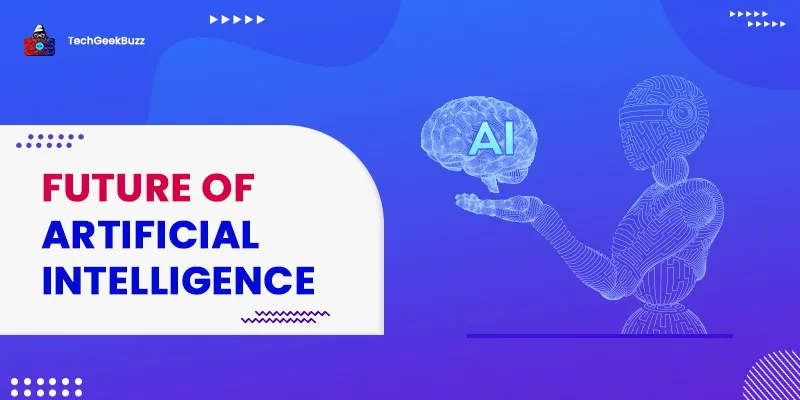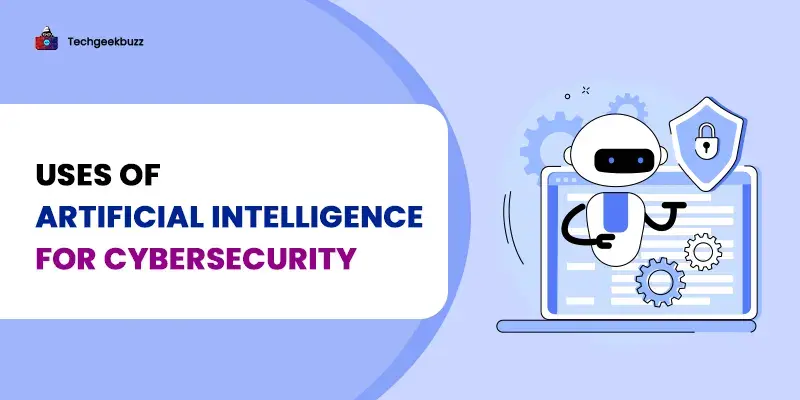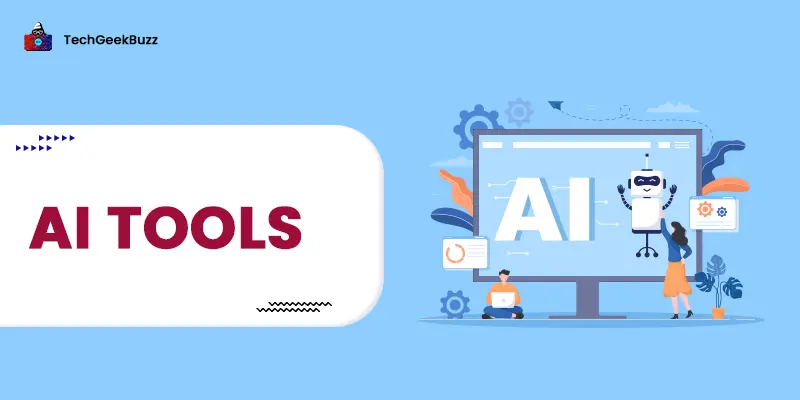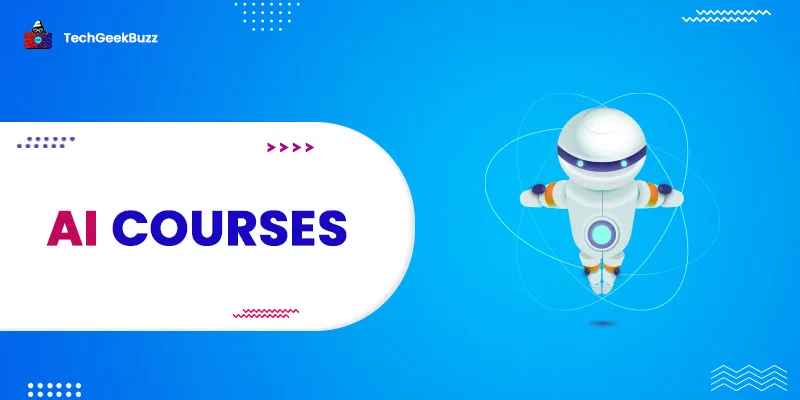There is no denying that artificial intelligence is revolutionizing the entire world and becoming a crucial element of various emerging technologies, such as big data, IoT, and robotics. In just a few years, AI has transformed fantasy into reality. Robots are now no longer part of only sci-fi movies but are also part of the real world. They are assisting humans in automating various tasks in different industry types.
The use of artificial intelligence (AI) in everyday life has become ingrained, and almost all people are using it knowingly or unknowingly. We use AI in our daily lives, from asking Siri or Google Assistant about the current time or weather to asking them to schedule your next meeting. Our lives are now simpler and easier than ever, thanks to AI.
AI has come a long way. It has not evolved as smoothly or as quickly as it is now widely employed. Though AI is incredibly beneficial in today’s digital era, many visionaries have stated that AI could be dangerous as well. Because if machines started thinking beyond human capabilities, where would humans be? But we should be mindful of the fact that we have the power to diffuse what we create.
In this article, let us discuss the impact of AI in today’s world, how AI could be dangerous to human lives, and the future of AI. But first, let's take a quick look at what artificial intelligence (AI) actually is.
So, let us get started without further ado!
What is Artificial Intelligence?
Artificial Intelligence is a field of computer science that leverages machines or computer systems to simulate human intelligence and carry out specific tasks. In simple terms, we can define AI as the ability of machines or computer-controlled robots to carry out tasks that require human intelligence.
Empowering machines and computer systems to make decisions with their own intelligence is called artificial intelligence. In a nutshell, AI is the ability of machines to learn, think, and work on their own to accomplish a specific task.
Human life is entirely surrounded by gadgets that employ artificial intelligence, and these gadgets are making everyday tasks easier.
For example, one of the widely used digital assistants, Siri, performs many of your daily tasks, such as it reminds you about your appointments and meetings, plays your favorite music, keeps a check on your grocery list, or reads the news. It has evolved into a companion of humans, but with human-like capabilities and not an actual human.
Types of AI
We can classify AI or AI-powered systems based on their capabilities and functionalities.
Capability-Based AIs
Based on capabilities, we can categorize AI into three types, namely Weak or Narrow AI, General AI, and Super AI. Let us now go over each type in more detail.
- Weak or Narrow AI: It is the most common and currently employed type of AI. Narrow or weak AI is capable of performing a specific task with intelligence. This type of AI is trained to perform only a specific task and cannot go beyond its limitations. Some common examples of Narrow AI are speech recognition, image recognition, self-driving cars, etc.
- General AI: The primary idea behind General AI is it could think like humans and perform any task efficiently. However, there isn't a system like this; instead, scientists are working to create machines with general AI.
- Super AI: Super AI is a sort of AI with cognitive capabilities that is significantly more intelligent than humans and is capable of performing any task much better than humans. Like General AI, Super AI is also a hypothetical concept.
Functionality-Based AIs
Based on functionalities, we can divide AI into four types, namely Reactive machines, Limited Memory, Theory of Mind, and Self-Awareness. Let's take a look at each of these types individually.
- Reactive Machines: These machines do not store experiences or memories, focus on the current scenario, and react to it with the best possible action. Google’s AlphaGo and IBM’s Deep Blue System are examples of reactive machines.
- Limited Memory: As its name suggests, Limited Memory machines are capable of storing previous experiences, memories, or some data for a short time. They can use the stored data for a specific time period. Self-driving cars are the best examples of Limited Memory machines.
- Theory of Mind: Theory of Mind AI is a hypothetical concept. This type of AI should understand human emotions and beliefs and interact socially like humans.
- Self-Aware: Self-Aware AIs are not yet developed. The Self-Aware machines will be more intelligent than humans and have their own sentiments, self-awareness, and consciousness.
Therefore, General AI, Super AI, Theory of Mind AI, and Self-Aware AI are the future of artificial intelligence, whereas Narrow or Weak AI, Reactive Machines, and Limited Memory machines are the present of AI.
How Could AI be Risky?
Since AI is massively gaining popularity, there are risks associated with it, ranging from mild to catastrophic risks. AI is generally regarded as harmful in two ways:
- AI is designed to act in a harmful manner.
- AI is programmed to perform meaningful actions, yet in the process of doing so, it causes harm.
The following are some immediate risks that AI can pose in the future:
-
Job Automation and Disruption
Automation is the heart of artificial intelligence. From production factories to self-driving cars, we observe automation everywhere. AI systems outperform humans in carrying out various tasks. They outperform humans in terms of efficiency, cost, and accuracy.
For instance, AI-enabled systems are much more adept than human specialists at identifying art forgeries. Therefore, AI systems will take over human jobs, leaving humans unemployed.
-
Autonomous Weapons
Killer Robots, another name for autonomous weapons, are military robots that use pre-programmed instructions to locate their targets without human assistance. Almost all the developing countries across the globe are adopting autonomous weapons.
But autonomous weapons are dangerous for innocent and common people. What if these weapons kill innocent people instead of their targets? Or what if these weapons cannot distinguish between their targets and other ordinary people? Therefore, the use of autonomous weapons is another reason why AI could be dangerous.
-
Terrorism
Although artificial intelligence is revolutionizing every part of life, it might, regrettably, aid terrorists in achieving their objectives. Even today, many terror agencies use AI-enabled drones to carry out attacks in a specific region. Iraq witnessed a drone attack in 2016 carried out by ISIS, which killed two people.
Not only drones but terror agencies can use autonomous vehicles to deliver and explode bombs in a specific area. In addition, they can create guns to fire without any human intervention. Another application of AI that terrorists can use is killer robots or autonomous weapons, as mentioned above.
Future of Artificial Intelligence
Since its inception, AI has been transforming almost every industry vertical, and it will further continue to bring more inventions that will make human lives even more convenient. Let us now discuss the future of AI in some major industry verticals:
-
Healthcare
Though AI technology has its applications in the healthcare industry at present, many people are deprived of healthcare services due to the fewer number of good doctors, lack of infrastructure, and many other factors. Also, people from rural areas having severe disorders could not reach out to specialist doctors.
In such cases, AI has the ability to help people in diagnosing diseases based on the symptoms even without physically visiting a doctor. The primary idea is that AI would collect a patient’s data from previous medical records or fitness bands, analyze patterns, accordingly suggest proper medications, and deliver them to the patient’s home.
We have witnessed the application of AI in diagnosing fatal diseases. The day is not far away when AI will be employed in diagnosing various common diseases and providing medications. This invention could result in no need to visit doctors physically for common diseases.
-
Education
AI has revolutionized the traditional learning and teaching system. It has become much easier for students to access learning materials from anywhere, get answers to their questions in seconds through chatbots, and, more importantly, are able to learn at their own pace through personalized training programs.
As we cannot predict how AI will further change the education field, we can say that it would be even more accurate in analyzing the students’ data and providing a more personalized experience.
Moreover, AI would replace traditional classrooms by employing Virtual Reality to make learning more interactive. Even students would be able to carry out various science experiments in a virtual environment, which would be safer than the real one. In short, AI would completely transform traditional classrooms into smart and digital ones.
-
Finance
Like all other domains, AI also has a great impact on the financial domain. It has the potential to boost the nation’s economy by managing the funds in the best possible way that would not be far better than the human manager. In addition, it has the power to transform the classic approach to investing and cryptocurrency trading.
AI algorithms are much better than humans in identifying complex trading signals, allowing companies to get better at trading. Moreover, The cryptocurrency market seems more volatile due to human emotions. AI would do better in cryptocurrency trading because it does not have emotions like humans and make no errors as humans do.
Today, organizations are able to perform their operations and processes quickly with great efficiency because of automation, which is a significant application of AI. With the increasing digital transformation, the rate of data breaches has also increased, and AI can be the best technology to prevent cyber threats.
AI can be helpful in detecting potential cyber threats, regularly scanning IT assets and identifying critical security flaws or vulnerabilities automatically, and responding to evolving cyber threats.
-
Transportation
There is no denying that AI is at its typing point in the transportation industry. We can see self-driving in many parts of the world today. Another application of AI in transportation is traffic management to automatically manage road traffic and give better directions to vehicles.
We have drone taxis as the future of artificial intelligence in transportation. In 2016, Uber released its paper stating that it would develop aerial taxis in the near future. In addition, we can also expect the use of AI in making transportation more safe, efficient, and cost-effective than it is today.
Conclusion
This brings us to the end of our discussion on the future of artificial intelligence. Being one of the most booming technologies in the world, AI has spread its tentacles across every industry vertical. No doubt, it will evolve at a greater pace, bringing new inventions in every field to make human lives even better. However, we should be mindful of the fact that AI could get worse or could be a bane if misused.
Hopefully, you might have got a clear understanding of how AI will be in the future and how it could be risky if used with the wrong intentions through this article.
People are also reading:
- Artificial Intelligence Technologies
- Benefits of Artificial Intelligence
- Types of Artificial Intelligence
- Applications of Artificial Intelligence
- Artificial Intelligence Projects
- Top-Rated AI Courses
- Artificial Intelligence vs Machine Learning
- Best Artificial Intelligence Books
- AI vs ML vs Deep Learning
- Data Science vs AI





Leave a Comment on this Post